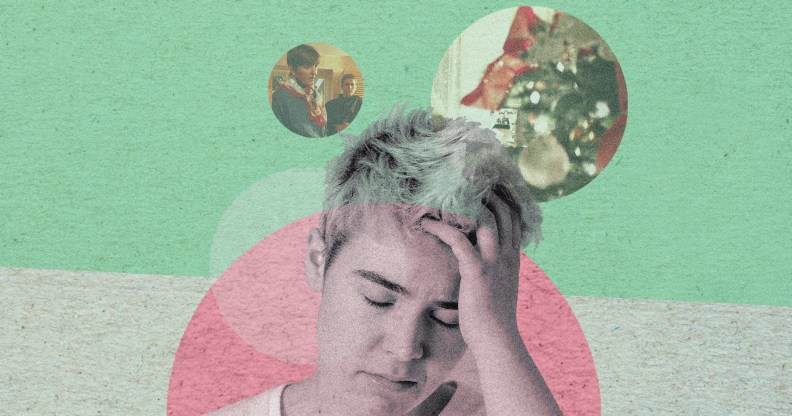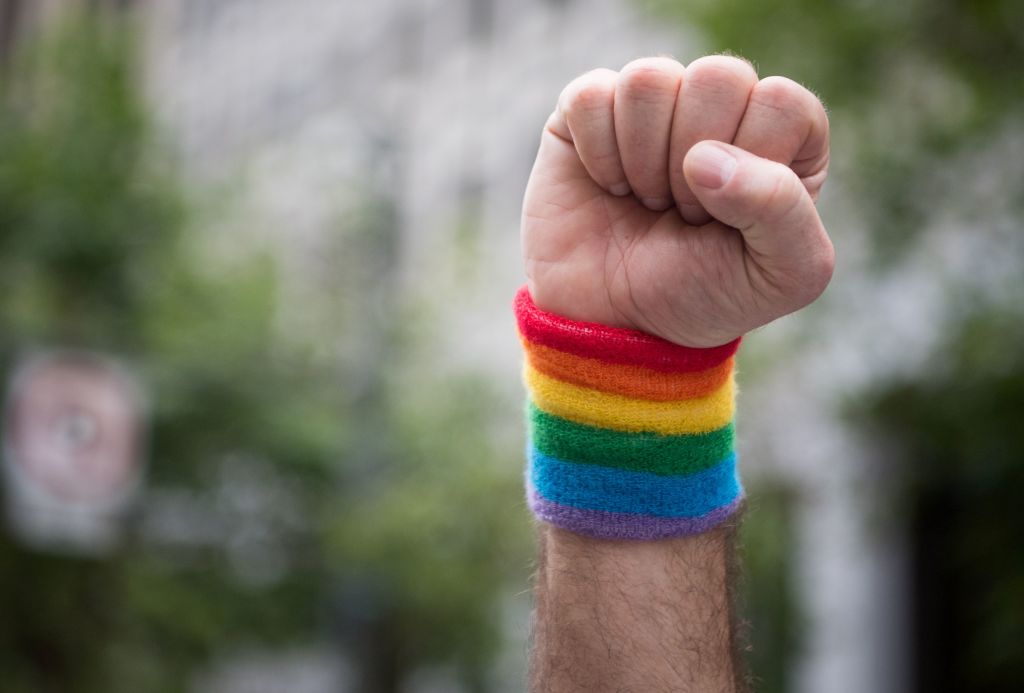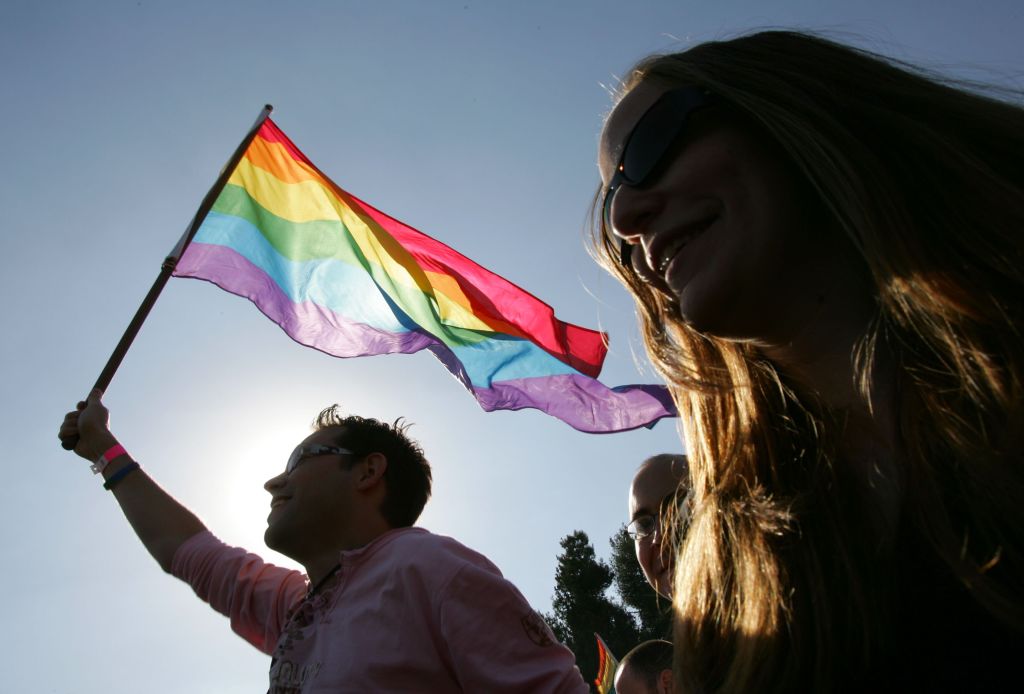Survival tips for being forced back into the closet over the holidays: ‘Stay grounded in authenticity’

Many queer people are forced back into the closet over the holidays. (Getty)
The holiday season isn’t always easy for LGBTQ+ people, particularly when your family isn’t particularly accepting of queer identities.
For those who spend Christmas, Hanukkah or other religious festivals with families, it can be a fraught time. Many simply choose to retreat into the closet entirely because they don’t feel able to come out to loved ones for fear of a negative reaction.
Chaim – whose name has been changed to protect his identity – is one of the many queer people who is spending the holidays in the closet. He tells PinkNews that he made the difficult decision to keep the fact that he’s bisexual from his family because he fears he wouldn’t be accepted.
Because Chaim lives with a disability, and relies on his parents for support, he has to tread carefully to ensure he doesn’t alienate his family.
The 21-year-old lives with his parents on the east coast of America, and most of the year, his sexuality isn’t an issue. He’s out to others in his life, and he’s able to keep that part of his life cordoned off at home.
But when Hanukkah comes around, there’s an expectation that he and his family will spend significant amounts of time with each other. That means that he’s effectively pushed back into the closet for the holiday season.
“I’ve thought long and hard about my decision to stay in the closet with them, and it hasn’t been an easy choice to make,” he tells PinkNews.
“Every few weeks I find myself reconsidering it, but after mapping out possible outcomes with my therapist, I’ve concluded it simply isn’t worth the risk, as difficult as that is.”
Chaim fears being disowned if he comes out as bisexual
A few years ago, Chaim “came out” to his Orthodox Jewish parents as an atheist. It was difficult enough for them to accept that, and during that process, he had a series of “disturbing conversations” with his family that convinced him his bisexuality would never be accepted.
“One such conversation was with my grandparents, who told me that when my uncle was in college and fell in love with a non-Jewish lady, they threatened to basically disown him and cut him off from all financial support unless he left the girl. And this was for a heterosexual relationship!”
That discussion, and others he’s had with family members, convinced him that he needed to stay in the closet for his own good. He points out that the medication he needs to manage his disability would cost more than $10,000 per month without health insurance, so he needs to stay on good terms with his parents.
“I simply can’t afford that without family support, so risking being disowned is not much of an option. I think it’s possible I could come out to my family and ultimately be accepted, but the stakes are so high that I can’t take that risk.”

Being in the closet is never easy, but it’s hardest of all when the holidays come around.
“It’s really hard, I won’t lie,” he says.
I’m sure if I could be entirely out I would be in an even better mental place, but for now, that remains a dream.
“The story of Hanukkah is all about standing up in the face of both religious and secular oppression, and in some ways I feel like a coward, not speaking up for the people I love and for what I believe in.
“In media it’s almost always presented as an incredibly heroic thing to do, coming out to homophobic family, and it’s made even more painful by the possibility that they might even come to accept me for who I am, in time, but how can I risk it?”
Chaim has suffered from depression and suicidal ideation because of his situation, but coming out to others in his life has helped him get to a better place.
“I’m sure if I could be entirely out I would be in an even better mental place, but for now, that remains a dream.”
What to do if you’re forced back into the closet over the holidays
Chaim’s advice for other LGBTQ+ people at this time of year is simple: find friends you can confide in when you’re spending time with family.
“A life-changing – and possibly even life-saving – action for me was joining a small online Discord group and cultivating queer friends there from around the world,” he says.
“That group has become a sort of ‘found family’ to me, where we love each other unconditionally. That sort of virtual support network is so, so important when you’re surrounded by people in real life who only know a false model of you.”
Moe Ari Brown is a love and connection expert with dating app Hinge. They say LGBTQ+ people can face a wide range of challenges during the holidays, from coming out for the first time to changing pronouns with loved ones.
“The holidays mark a time where many people desire deeper connection and celebration with those they love,” Brown tells PinkNews.
“Because so many LGBTQIA+ people experience the rejection of their identities by families, friends and other significant relationships, the season may be a time where the loss of those connections can feel more present than usual. This results in feelings of isolation, loneliness, grief and sadness.”
Their advice is to plan ahead of time how to broach conversations about your identity, and who you’re willing to talk to about your queerness.
“When approaching conversations with family during the holidays, first consider how you wish to honour your authenticity in this experience before considering how others might respond,” he says.
“Ultimately, most people want their family to witness who they are in a way that feels celebratory of their identities. If you’re thinking about sharing something important with your family during the holidays, determine ahead of time whether you’ll talk to everybody all at once or if you want to have individual conversations.”

Queer people could also consider bowing out entirely – Brown says changing your physical location can “drastically change your perspective”.
If your family does or says something that you find offensive, remain grounded in your authenticity, stand up for yourself and educate them on what they got wrong.
“Spending time with new people can also help you get through this time of year – including ‘Holidating” with romantic interests.”
If you do end up spending the holiday season with anti-LGBTQ+ family members, try to keep level-headed, Brown advises.
“If your family does or says something that you find offensive, remain grounded in your authenticity, stand up for yourself and educate them on what they got wrong.
“Have your ‘chosen family’ and friends on hand to seek support and advice, they can hold space and witness you fully as you navigate any challenges.”
How did this story make you feel?

